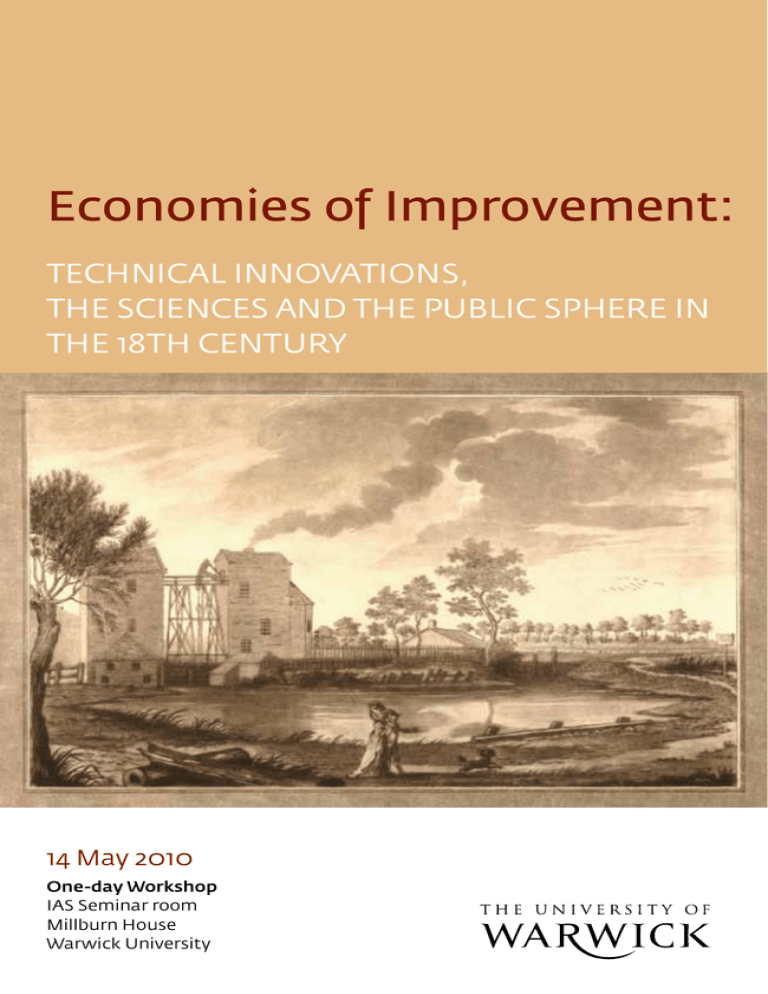Economies of Improvement: TECHNICAL INNOVATIONS, THE SCIENCES AND THE PUBLIC SPHERE IN
advertisement

Economies of Improvement: TECHNICAL INNOVATIONS, THE SCIENCES AND THE PUBLIC SPHERE IN THE 18TH CENTURY 14 May 2010 One-day Workshop IAS Seminar room Millburn House Warwick University ECONOMIES OF IMPROVEMENT: TECHNICAL INNOVATIONS, THE SCIENCES AND THE PUBLIC SPHERE IN THE 18TH CENTURY One-day Workshop 14 May 2010, IAS Seminar room, Millburn, Warwick University This 1-day Workshop seeks to understand the range of motivation and social interaction which supported innovative activity during the C18th., and to highlight different forms of investment process. From this viewpoint, the market as such may be seen as embedded within a wider public sphere, whose resources could be variously mobilized. In addition, therefore, to a traditional economic understanding of business enterprise, the Workshop will analyze and characterize other modes of investment, whose nature could be as much civic, or cultural. Enlightenment conjoins individual emancipation and creative activity, material advance and public engagement, and further involves the emergence of cultures of technology in several key fields (including mechanics, chemistry, natural history, aspects of naval and military science, and colonial development). An economy partly motivated by the emergent notion of secular progress could also act as a powerful resource for markets claiming the interest of the public good as a counterbalance to the fictive economics of speculation. Our main challenge consists in crossing different fields (commercialization and consumption, enterprise, invention and the sciences, charity and philanthropy, subscription, governmental and other public body support). The researchers involved will help to explore new insights regarding the relation between cultures of civic improvement and those of science and technology, and can point the way to a reintegration of this notion of investment within the public sphere. ECONOMIES OF IMPROVEMENT: TECHNICAL INNOVATIONS, THE SCIENCES AND THE PUBLIC SPHERE IN THE 18TH CENTURY Programme 9:30 Welcome and coffee 9:50 Introduction Marie Thébaud-Sorger (Warwick) Economy of innovation: the making of new markets, new knowledge and new objects 10:00 Robert Iliffe (Sussex) Material culture in the Scientific Revolution 10:25 Sarah Easterby-Smith (Warwick) Propagating commerce: plant breeding and market competition in London and Paris, c. 1770-1814 10:50 Lissa Roberts (Twente) Strategies of steam-engine entrepreneurs in the second half of 18-C France 11:15 Discussion 11:45 Working lunch Economic and industrial changes facing the public good 13:00 Koji Yamamoto (King’s College, London) Public Service in the Early Financial Revolution: the Case of the Company of the Mine-Adventurers of England, 1698-1710 13:25 William J. Ashworth (Liverpool) The British state and Industrialisation during the eighteenth century 13:50 Maxine Berg (Warwick) Industrial surveys in India in the 18thC 14:15 Discussion 14:45 Coffee ECONOMIES OF IMPROVEMENT: TECHNICAL INNOVATIONS, THE SCIENCES AND THE PUBLIC SPHERE IN THE 18TH CENTURY Programme (Continued) Innovation and the Sciences: Civil Benevolence and the Economics of the Public Sphere 15:00 Emma Spary (UCL) Parisian pharmacy and the reinvention of économie: three cases, 1760-1810 15:25 Christelle Rabier (Paris) For the Benefit of Mankind: Judging Medical Instruments at the Académie royale de chirurgie, 1750-1792 15:50 John Christie (Leeds, Oxford, MPI Berlin) Science and Technical Innovation in the Enlightenment Public Sphere: Practice and Theory in Enlightenment Scotland. 16:15 Discussion 16:45 General discussion 17:20 Conclusive remarks: Christine MacLeod (Bristol) 17:30 Drink Discussants: Charles Withers (Edinburgh), Peter Jones (Birmingham), Mark Knights (Warwick), Christine MacLeod (Bristol), Liliane Pérez (CDHTE-Paris) Informations Convenor: Marie Thébaud-Sorger, m.thebaud-sorger@warwick.ac.uk Registration : Amy Evans, GHCC administrator: amy.evans@warwick.ac.uk With the support of Marie Curie (FP7); the Economic History Society; Global History and Culture Centre; Eighteenth Century Centre



